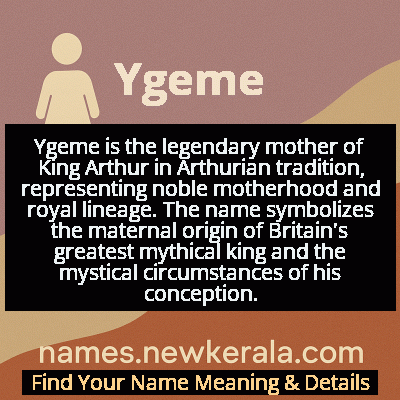Ygeme Name Meaning & Details
Origin, Popularity, Numerology Analysis & Name Meaning of Ygeme
Discover the origin, meaning, and cultural significance of the name YGEME. Delve into its historical roots and explore the lasting impact it has had on communities and traditions.
Name
Ygeme
Gender
Female
Origin
Arthurian
Lucky Number
1
Meaning of the Name - Ygeme
Ygeme is the legendary mother of King Arthur in Arthurian tradition, representing noble motherhood and royal lineage. The name symbolizes the maternal origin of Britain's greatest mythical king and the mystical circumstances of his conception.
Ygeme - Complete Numerology Analysis
Your Numerology Number
Based on Pythagorean Numerology System
Ruling Planet
Sun
Positive Nature
Leaders, ambitious, highly driven, self-reliant, innovative.
Negative Traits
Overly aggressive, domineering, impatient, selfish.
Lucky Colours
Red, orange, gold.
Lucky Days
Sunday.
Lucky Stones
Ruby, garnet.
Harmony Numbers
2, 3, 9.
Best Suited Professions
Entrepreneurs, managers, engineers.
What People Like About You
Courage, determination, leadership.
Famous People Named Ygeme
Ygeme (Igraine)
Arthurian Noblewoman
Mother of King Arthur and central figure in Arthurian origin mythology
Ygeme de Tintagel
Literary Character
Featured in Geoffrey of Monmouth's Historia Regum Britanniae as Arthur's mother
Igraine du Bois
Mythological Figure
Original wife of Duke Gorlois before marrying Uther Pendragon through magical deception
Name Variations & International Equivalents
Click on blue names to explore their detailed meanings. Gray names with will be available soon.
Cultural & Historical Significance
In the broader cultural landscape, Ygeme symbolizes the noble lineage and divine right that characterized medieval concepts of royalty and succession. Her character bridges pagan and Christian elements within the Arthurian cycle, representing both earthly nobility and the supernatural heritage that would define Arthur's reign. The circumstances of Arthur's conception—where Uther, magically disguised as her husband, fathers the future king—highlight medieval fascination with predestination and the intervention of supernatural forces in human affairs. Ygeme's story has been reinterpreted through centuries, from medieval chronicles to modern feminist retellings, reflecting changing attitudes toward motherhood, agency, and the role of women in foundational myths.
Extended Personality Analysis
Ygeme is traditionally portrayed as embodying noble grace, maternal strength, and quiet dignity within Arthurian literature. As a high-born noblewoman and later queen consort, she demonstrates the refined manners, political intelligence, and emotional resilience expected of medieval aristocracy. Her character navigates dramatic personal transitions—from wife of Duke Gorlois to queen of Uther Pendragon—with a remarkable capacity for adaptation while maintaining her core identity and maternal devotion. This psychological complexity makes her one of the more richly drawn female characters in early Arthurian texts.
The personality archetype Ygeme represents combines traditional feminine virtues with understated power and emotional depth. She exhibits loyalty, discretion, and the quiet influence that shapes destiny from behind the scenes. Her character suggests a woman capable of profound grief for her first husband, dutiful acceptance of her second marriage, and unwavering commitment to her children's welfare. This multifaceted personality reflects the medieval ideal of noble womanhood while also hinting at the inner strength required to survive in a world of political intrigue, magical intervention, and the heavy burden of being the mother of a legendary hero. Her traits have been variously emphasized across different retellings, from passive vessel of destiny to active participant in her own story.
Modern Usage & Popularity
In contemporary naming practices, Ygeme remains an exceptionally rare choice, primarily confined to Arthurian enthusiasts, historical fiction contexts, and parents seeking unique mythological names with aristocratic connotations. The name has never gained mainstream popularity and doesn't appear in official baby name registries or charts. Modern usage typically favors the more recognizable variant 'Igraine,' though both forms appeal to those specifically interested in Arthurian legend and medieval literature. The name's extreme rarity ensures it maintains an air of exclusivity and scholarly appeal, often chosen by parents with particular interest in British mythology or seeking names that reflect literary sophistication rather than current trends. Its usage is almost exclusively limited to English-speaking countries with strong Arthurian literary traditions, particularly Britain and the United States.
Symbolic & Spiritual Meanings
Symbolically, Ygeme represents the concept of royal motherhood and the mystical vessel through which greatness enters the world. She embodies the threshold between ordinary and extraordinary existence, serving as the human connection between mortal and magical realms in Arthurian mythology. Her character symbolizes transformation—from noble wife to queen mother—and the idea that foundational power often flows through maternal lines. The name carries connotations of beauty, nobility, and the quiet strength that underpins legendary narratives, representing the feminine principle in heroic origin stories. As the gateway to Arthur's birth and the Camelot legacy, Ygeme symbolizes the intersection of human agency and divine destiny, the earthly vessel through which mythical greatness manifests in the human realm.

